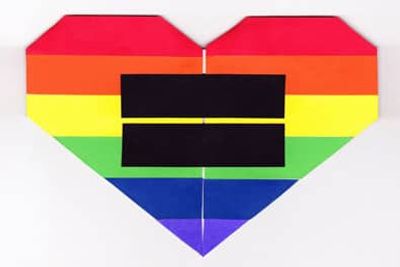By Steve Kilar, July 2019 Issue.
In May, the U.S. House of Representatives passed the Equality Act,
landmark legislation that has the potential to modernize our federal civil
rights laws by explicitly making discrimination based on sexual orientation and
gender identity unlawful nationwide.
The bill’s
passage, by a margin of 236 to 173, was a huge victory. It was the first time
that an LGBTQ rights bill of this magnitude made it through either the U.S.
House or Senate.
Polling has for years shown that there is
majority support among Americans for nondiscrimination protections for LGBTQ
people. The passage of the Equality Act demonstrates that support among voters
for LGBTQ equality can translate into support among politicians. Even eight
Republicans — from Indiana, Florida, Texas, Oregon, New York, and Pennsylvania
— voted in favor of the Equality Act.
Public Religion
Research Institute, a nonprofit, nonpartisan organization that produces policy
research related to religion and culture in the U.S., recently released 2018
survey results about LGBTQ equality.
“Nearly seven
in 10 (69%) Americans favor laws that would protect LGBT people from
discrimination in jobs, public accommodations, and housing,” the researchers
stated. “Support for these protections has remained steady over the past few
years, with around seven in 10 Americans reporting that they favor
nondiscrimination provisions for LGBT people in 2017 (70%), 2016 (72%), and
2015 (71%).”
The researchers
found there’s broad support for a law like the Equality Act, including majority
support within all major religious denominations, racial groups and states, and
across the political spectrum.
As ACLU
lobbyists put it in a letter of support for the Equality Act that was sent to
members of Congress, the bill would “provide LGBTQ people with consistent,
explicit, and nationwide protections across all of the key areas of daily life,
including employment, housing, and access to public spaces and services.”
Right now,
LGBTQ people in some places are protected from discrimination by a patchwork of
state and local laws. Arizona still does not protect LGBTQ people from
discrimination statewide, although six municipalities (Phoenix, Tempe, Tucson,
Flagstaff, Sedona, and Winslow) include sexual orientation and gender identity
in their nondiscrimination ordinances.
The Equality
Act would supplement this patchwork, creating stability across the country for
LGBTQ people and giving businesses that operate across state lines a better
understanding of their potential liability for discrimination. In addition, the
Equality Act includes important updates to federal civil rights laws that have
nothing to with sexual orientation or gender identity.
Here are some
of the ways the Equality Act would improve our federal civil rights laws. Many
of the changes would benefit everyone, not only LGBTQ people.
The Equality
Act would prohibit housing and employment discrimination based on sexual
orientation and gender identity. Some courts have determined sexual orientation
and gender identity discrimination are forms of sex discrimination, which is
already prohibited by federal law in the housing and employment contexts. But
the U.S. Supreme Court is considering LGBTQ employment cases during its next
term and could come to the opposite conclusion. For that reason, it would be best
to have an LGBTQ-inclusive definition of sex discrimination written into the
housing and employment civil rights statutes.
The Equality
Act would prohibit sex discrimination, including sexual orientation and gender
identity discrimination, in public accommodations. Right now, federal law only
prohibits public accommodations from discriminating because of race, color,
religion or national origin, so this update would provide new discrimination
protection for everyone.
The Equality Act would expand the types of
businesses considered public accommodations. Under current federal law, public
accommodations include hotels and motels, restaurants, gas stations, and
entertainment venues, like movie theatres and sports stadiums. The Equality Act
would make this list of businesses longer by including “any establishment that
provides a good, service, or program” in either a brick-and-mortar setting or
online. Transportation providers, retailers, salons, food banks, shelters, and
funeral parlors, as well as health care, accounting, and legal services, are
all among the types of businesses that would be newly identified as public
accommodations. This expanded definition would be helpful to everyone and would
clearly prohibit the common forms of discriminatory harassment that have come
to be known as “shopping while black” and “flying while brown.”
The Equality
Act would also make it clear that sex discrimination, including sexual
orientation and gender identity discrimination, is prohibited by credit
providers, public schools and other public services, and federally funded
programs. Excluding LGBTQ people from jury service because of their sexual
orientation or gender identity would also be banned.
The Equality
Act would also make plain that a federal law protecting religious freedom, the
Religious Freedom Restoration Act, is not a giant loophole for religious
beliefs to be used as a license to discriminate. Again, this clarification
benefits everyone who might face discrimination, not just LGBTQ people.
It seems unlikely the Equality Act will
gain traction in the Republican-controlled Senate. But because the strength of
our civil rights often depends on our elected officials, we should still know
where our senators stand on the bill so that we’re informed next time we’re asked
to cast a ballot in their favor.
Sen. Kyrsten
Sinema is a co-sponsor of the Equality Act. Sen. Martha McSally is not, and her
office did not respond to an inquiry about her position on the bill.
Mark Kelly, who
is challenging McSally in 2020, did reply though.
“No one should be subject to discrimination in the workplace or
elsewhere because of who they are,” Kelly said. “I support the Equality Act to
ensure that all LGBTQ Arizonans and Americans have equal protections and the
opportunity to earn a living and raise a family without fear of
discrimination.”
